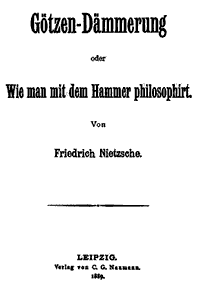
Twilight of the Idols (Chap. 3) Friedrich Nietzsche
На этой странице вы найдете полный текст песни "Twilight of the Idols (Chap. 3)" от Friedrich Nietzsche. Lyrxo предлагает вам самый полный и точный текст этой композиции без лишних отвлекающих факторов. Узнайте все куплеты и припев, чтобы лучше понять любимую песню и насладиться ею в полной мере. Идеально для фанатов и всех, кто ценит качественную музыку.

HOW THE "TRUE WORLD" FINALLY BECAME A FABLE. The History of an Error
1. The true world--attainable for the sage, the pious, the virtuous man; he lives in it, he is it.
(The oldest form of the idea, relatively sensible, simple, and persuasive. A circumlocution for the sentence, "I, Plato, am the truth.")
2. The true world--unattainable for now, but promised for the sage, the pious, the virtuous man ("for the sinner who repents").
(Progress of the idea: it becomes more subtle, insidious, incomprehensible--it becomes female, it becomes Christian. )
3. The true world--unattainable, indemonstrable, unpromisable; but the very thought of it--a consolation, an obligation, an imperative.
(At bottom, the old sun, but seen through mist and skepticism. The idea has become elusive, pale, Nordic, Königsbergian.)
4. The true world--unattainable? At any rate, unattained. And being unattained, also unknown. Consequently, not consoling, redeeming, or obligating: how could something unknown obligate us?
(Gray morning. The first yawn of reason. The cockcrow of positivism.)
5. The "true" world--an idea which is no longer good for anything, not even obligating--an idea which has become useless and superfluous--consequently, a refuted idea: let us abolish it!
(Bright day; breakfast; return of bon sens and cheerfulness; Plato's embarrassed blush; pandemonium of all free spirits.)
6. The true world--we have abolished. What world has remained? The apparent one perhaps? But no! With the true world we have also abolished the apparent one.
(Noon; moment of the briefest shadow; end of the longest error; high point of humanity; INCIPIT ZARATHUSTRA.)
1. The true world--attainable for the sage, the pious, the virtuous man; he lives in it, he is it.
(The oldest form of the idea, relatively sensible, simple, and persuasive. A circumlocution for the sentence, "I, Plato, am the truth.")
2. The true world--unattainable for now, but promised for the sage, the pious, the virtuous man ("for the sinner who repents").
(Progress of the idea: it becomes more subtle, insidious, incomprehensible--it becomes female, it becomes Christian. )
3. The true world--unattainable, indemonstrable, unpromisable; but the very thought of it--a consolation, an obligation, an imperative.
(At bottom, the old sun, but seen through mist and skepticism. The idea has become elusive, pale, Nordic, Königsbergian.)
4. The true world--unattainable? At any rate, unattained. And being unattained, also unknown. Consequently, not consoling, redeeming, or obligating: how could something unknown obligate us?
(Gray morning. The first yawn of reason. The cockcrow of positivism.)
5. The "true" world--an idea which is no longer good for anything, not even obligating--an idea which has become useless and superfluous--consequently, a refuted idea: let us abolish it!
(Bright day; breakfast; return of bon sens and cheerfulness; Plato's embarrassed blush; pandemonium of all free spirits.)
6. The true world--we have abolished. What world has remained? The apparent one perhaps? But no! With the true world we have also abolished the apparent one.
(Noon; moment of the briefest shadow; end of the longest error; high point of humanity; INCIPIT ZARATHUSTRA.)
Комментарии (0)
Минимальная длина комментария — 50 символов.












